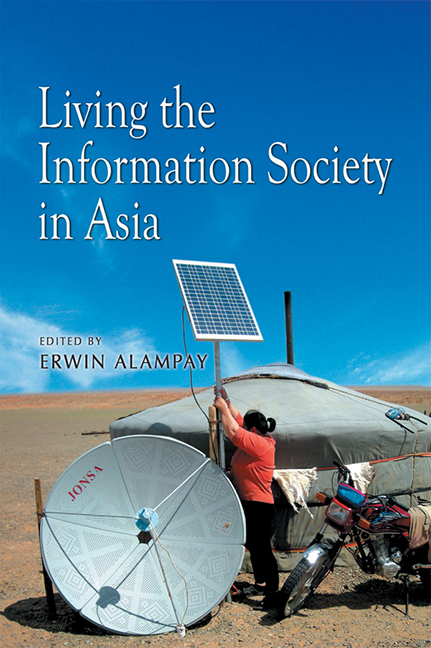Book contents
- Frontmatter
- Contents
- Foreword
- Preface
- List of Abbreviations
- Contributors
- Introduction: Perspectives of ICT Research in Asia
- 1 What Would Durkheim Have Thought? Living in (and with) the Information Society
- 2 What Is a Mobile Phone Relationship?
- 3 Technologies of Transformation: The End of the Social or the Birth of the Cyber Network?
- 4 Becoming Mobile in Contemporary Urban China: How Increasing ICT Usage Is Reformulating the Spatial Dimension of Sociability
- 5 Mobile Religiosity in Indonesia: Mobilized Islam, Islamized Mobility and the Potential of Islamic Techno Nationalism
- 6 Moral Panics and Mobile Phones: The Cultural Politics of New Media Modernity in India
- 7 Stories from e-Bario
- 8 Life and Death in the Chinese Informational City: The Challenges of Working-Class ICTs and the Information Have-less
- 9 Institutional Responses to GIS Adoption for RPTA in Local Governments
- 10 Customer Acquisition among Small and Informal Businesses in Urban India: Comparing Face-to-Face and Mediated Channels
- 11 The View from the Other Side: The Impact of Business Process Outsourcing on the Well-being and Identity of Filipino Call Centre Workers
- 12 Empowering Thai Homeworkers through ICTs
- Index
12 - Empowering Thai Homeworkers through ICTs
Published online by Cambridge University Press: 21 October 2015
- Frontmatter
- Contents
- Foreword
- Preface
- List of Abbreviations
- Contributors
- Introduction: Perspectives of ICT Research in Asia
- 1 What Would Durkheim Have Thought? Living in (and with) the Information Society
- 2 What Is a Mobile Phone Relationship?
- 3 Technologies of Transformation: The End of the Social or the Birth of the Cyber Network?
- 4 Becoming Mobile in Contemporary Urban China: How Increasing ICT Usage Is Reformulating the Spatial Dimension of Sociability
- 5 Mobile Religiosity in Indonesia: Mobilized Islam, Islamized Mobility and the Potential of Islamic Techno Nationalism
- 6 Moral Panics and Mobile Phones: The Cultural Politics of New Media Modernity in India
- 7 Stories from e-Bario
- 8 Life and Death in the Chinese Informational City: The Challenges of Working-Class ICTs and the Information Have-less
- 9 Institutional Responses to GIS Adoption for RPTA in Local Governments
- 10 Customer Acquisition among Small and Informal Businesses in Urban India: Comparing Face-to-Face and Mediated Channels
- 11 The View from the Other Side: The Impact of Business Process Outsourcing on the Well-being and Identity of Filipino Call Centre Workers
- 12 Empowering Thai Homeworkers through ICTs
- Index
Summary
INTRODUCTION
This chapter discusses how Thailand's homeworkers use information and communication technology (ICT) to enhance the production process of the small business enterprises and widen market reach of products they are selling. It also presents the issues confronting homeworkers in the use of ICT in their work, particularly those from vulnerable groups.
This research is part of a regional study on women homeworkers from three Southeast Asian countries — Indonesia, Thailand and Malaysia — where people use ICT in their work. The study tries to answer two main questions:
• What are the key gender-specific issues and challenges faced by women homeworkers living among Thailand's urban poor?
• How can women homeworkers be empowered by using ICTs for economic activities, and take ownership and control of the management of social networks, information-sharing and other activities?
Considered in this research are three issues concerning women and their use of technologies:
1. Marginalization of women in the labour market. Although labour force participation of women in Thailand is high, issues related to women's employment status and the recognition of the contribution of women in reproductive and productive work are still lingering concerns. The participation in economic activities increases the burden of women as they bear most of the responsibilities for the domestic work. Household division of labour is still stereotyped and the introduction of ICT usage may add, rather than reduce, homeworkers’ burden and responsibilities.
2. Unrecognized contribution of women. Many women, especially the subcontractors or waged-homeworkers, remain unrecognized in the production process. In producing the parts of end-products, women have not been the main users of technology.
3. Masculine culture of technology. In some cultures, inherent factors that hinder women from using technology still exist. These factors promote a masculine view of technology. In Thailand, this situation gradually changed as women gained access to ICT, which became affordable, wider in coverage, and user-friendly. Thus, ICT acted as a vehicle to promote gender equity.
Review of Literature
Although much has been written about homeworkers in Thailand and other issues regarding the use of ICT, there is a dearth of research concerning Thai homeworkers and their use of digital technology.
- Type
- Chapter
- Information
- Living the Information Society in Asia , pp. 227 - 242Publisher: ISEAS–Yusof Ishak InstitutePrint publication year: 2009

